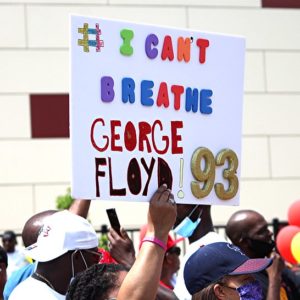A judge set bail for former police officer Derek Chauvin in the amount of $1.25 million on his second-degree murder charge for George Floyd’s killing. The question remains as to why Floyd’s killer is charged with only second-degree murder.
I watched the George Floyd video through a different lens than most people. I viewed it through my eyes as a former prosecutor. And I wonder why Minnesota Attorney General Keith Ellison did not charge Chauvin with first-degree murder.
I tried many homicide cases and obtained first-degree murder convictions on far less evidence than what I saw in that video. I strongly disagree with Ellison that the facts do not show premeditation and deliberation to prove first-degree murder.
Prosecutors determine criminal charges based on how facts fit the legal elements of the crime.
Minnesota’s first-degree murder statute states anyone who “causes the death of a human being with premeditation and with intent to effect the death of the person” shall be guilty of first-degree murder subject to life in prison. Intent to cause death does not necessarily mean the killer verbally expressed his or her intent.
And premeditation does not usually mean planning a murder weeks or days in advance. Premeditation can be formed in seconds or minutes, depending on the circumstances.
Officers restrained an unarmed George Floyd with handcuffs while lying on the ground. Two officers held Floyd down while Chauvin knelt one knee on Floyd’s neck for 8 minutes and 46 seconds — even after he became unconscious.
Floyd repeatedly stated that he could not breathe as the surrounding onlookers expressed the same to the officers. Chauvin’s kneeling continued for a full minute after paramedics arrived.
Prosecutors may prove the intent to kill and deliberation or premeditation by the amount of time that Floyd was restrained, his cries of lack of breath, the lack of any resistance on Floyd’s part and the continued knee on his neck.
Every minute that Chauvin continued kneeling on Floyd’s neck while hearing cries of “I can’t breathe” establishes the necessary intent to murder and forms the premeditation. Nearly nine minutes is more than sufficient time to reflect on Floyd’s death and change course, according to former special prosecutor Don Lewis.
Equally important in showing intent and deliberation is the continued kneeling for several minutes after Floyd was non-responsive and unconscious. Why else would Chauvin continue kneeling on Floyd’s neck for several more minutes?
I understand Attorney General Ellison’s unspoken concern that a jury may fail to convict Chauvin of first-degree murder. When I hear Trump lawyer Rudy Giuliani and Pat Robertson, a conservative Trump supporter and evangelical preacher advocate for first-degree murder charges, I think it’s safe to say that a jury seeing the videotape and hearing the testimony may likely think the same way and convict.
If a jury fails to find guilt on first-degree murder, then second-degree murder is deliberated.
It is not a first-degree murder conviction or nothing at all. Often, prosecutors send multiple counts of charges to the jury for deliberations. If the prosecution charges first-degree murder, a jury may still decide and convict on the lesser count of second degree if jurors fail to find guilt or unanimously agree on first-degree murder.
I understand concerns about a possible not-guilty verdict on first-degree murder charges in a police officer’s case. These concerns should not outweigh charging what the evidence shows as the appropriate murder charges.
I urge Minnesota’s attorney general to amend and upgrade the charges. Derek Chauvin must be charged with first-degree murder. Justice demands it.
And Mr. Floyd deserves it

